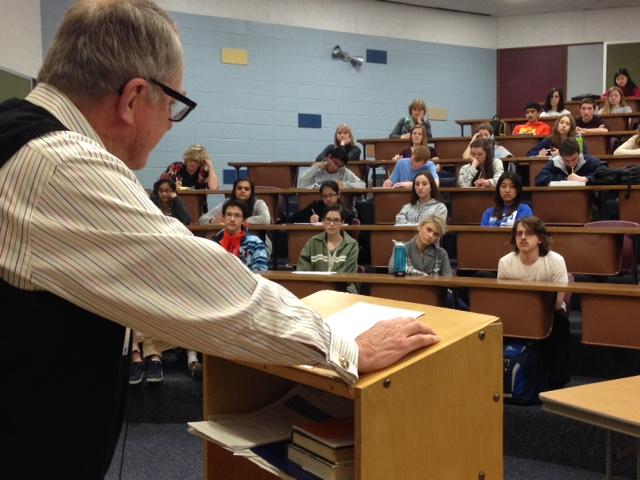AP English students experience lecture given by Dr. Robert Linders
AP English students at NPHS had the opportunity to listen to a lecture given by guest speaker Dr. Robert Linders on Herman Melville’s short story “Bartleby the Scrivener” this past Tuesday.
TOWAMENCIN- Exploring the concepts of boredom, ennui, and freedom, AP English students at NPHS listened to a lecture given by guest speaker Dr. Robert Linders on Herman Melville’s short story “Bartleby the Scrivener” this past Tuesday.
“I really appreciate your having me. I wish I had more time to answer questions,” Linders said in his visit.
Last year, Mrs. Janet Kratz, an English teacher at NPHS, invited Linders to give a lecture after giving her AP students an editorial about lectures and learning that most of them never heard one before.
“I was just shocked that that was not something that had been part of their experience and most likely will be very soon in college and beyond,” Kratz said. “That was when I decided to bring in Dr. Linders… I thought it would be a good introductory experience as to what a really interesting lecture could be.”
Kratz went on to explain why she chose to invite Linders.
“When you get to hear him a lot, it’s almost like a personality on TV or a character you get to know over time,” Kratz said. “Some of my favorite elements of his speech are the anecdotes and the stories… There’s so much humor as he laughs at himself. One of the things that makes hims such a powerful speaker is first and foremost his fund of information, which is phenomenal, his ability to speak in an engaging style, but also his ability to connect personally with his own experiences.”
Jon Burkhardt, a junior at NPHS, noted that he enjoyed Linders’ visit, particularly because of his strong analytical skills.
“I liked how he started by talking about Bartleby, but he tied it into the philosophical part of life,” Burkhardt said. “I liked how he gave insight on how real life works, not just on the surface, but in the deeper parts that most people look over and never really see.”
Linders has been giving speeches and lectures weekly for 50 years and is able to pull quotes from memory. After re-reading Bartleby, Linders thinks about what kinds of topics and ideas he could talk about during his lecture months in advance, and then spends several hours writing it.
“It just becomes a way of life,” Linders said. “Everything I see or read or hear I try to process.”
He explained how lectures can help elicit deep thinking in listeners.
“A lecture, whether you agree or disagree, gives you an opportunity to bounce off other ideas,” Linders said.
Kratz explained how Linders helped students think beyond what she taught in her classroom.
“Certainly some of the things he talked about looked at Bartleby from a different slant than I did in the classroom,” Kratz said. “Hopefully it gave them a deeper window into Melville and Bartleby… I hope it made them think about their own lives and some of the philosophical points he raised about holding opposite ideas in tension at the same time. I hope that some of the things he said about psychology and about literature will resonate and open their minds to learning more about psychology and literature and reading, so that this won’t simply have been a nice finite experience, but ideally an inspiration to read more and to think more and to know that reading isn’t just about you and a book. It’s about connecting with other people who have also had a shared experience of reading great literature.”
Kratz and Linders explained the importance of reading literature.
“I hope I inspired them to want to read good literature,” Linders said. “It helps you choose a career; it helps you follow your bliss. Reading [literature from] people who have thought deeply helps you become a better person and more sensitive and caring.”
“I hope that in the future, if they have the opportunity to go hear someone speak, they’d consider doing that again,” Kratz said. “We read literature to find a piece of ourselves. We read literature to understand the human condition… I think that good literature makes you identify at some level an experience and understand yourself a little bit more. It enriches your life in a way that nothing else can.”


